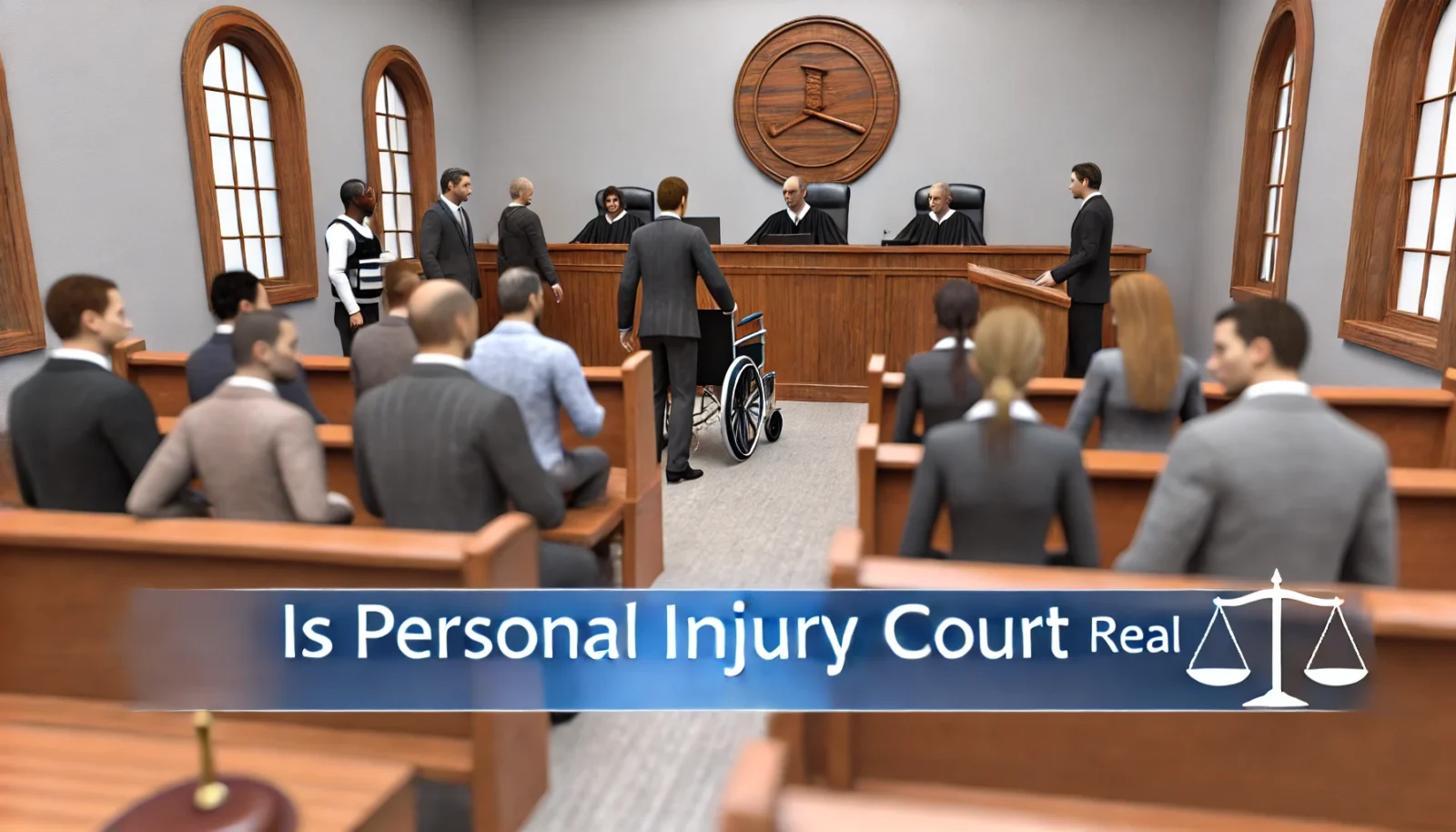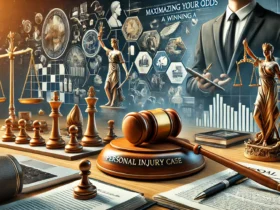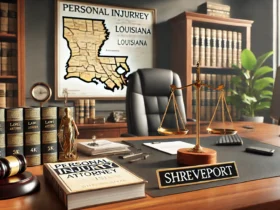Introduction To Personal Injury Courts
When people hear about legal matters related to injuries, they often ask, “Is Personal Injury Court real?” This question reflects a common curiosity about how personal injury cases are handled within the legal system. Let’s delve into what Personal Injury Court is, and how it fits into the broader legal landscape.
Personal Injury Court is a term that describes the segment of the legal system where cases involving physical or psychological harm due to another party’s negligence or misconduct are heard. This area of law is crucial because it addresses the need for individuals to seek compensation for their injuries and damages.
Personal Injury Law itself deals with cases where someone suffers harm as a result of another person’s actions or failure to act responsibly. This type of law covers a broad range of scenarios, from car accidents and workplace injuries to medical malpractice and product liability. The goal of personal injury law is to provide financial compensation to victims for their losses, which can include medical expenses, lost wages, and pain and suffering.
What Is Personal Injury Court?
To answer the question, “Is Personal Injury Court real?” we first need to understand what Personal Injury Court actually is. In a general sense, Personal Injury Court is not a distinct, separate court but rather a term used to describe the part of the civil court system where personal injury cases are adjudicated.
Explanation Of Personal Injury Court As A Legal Entity
Personal Injury Court refers to the jurisdiction within the broader court system where personal injury cases are tried. These cases are usually heard in civil courts, which handle non-criminal disputes. A personal injury case can be filed in various types of courts, depending on the amount of damages sought and the specifics of the case.
For instance, minor personal injury claims might be handled in small claims courts, while more complex cases involving significant damages might be addressed in higher civil courts. The term Personal Injury Court is used colloquially to refer to the specific area of the civil court system dealing with personal injury matters.
Distinction Between Personal Injury Court And Other Courts
The main difference between Personal Injury Court and other types of courts lies in the nature of the cases they handle. Criminal courts, for example, deal with cases where individuals are accused of committing crimes, such as theft or assault. On the other hand, Personal Injury Court focuses on resolving disputes related to injuries and seeking compensation for the damages incurred.
Civil courts, including those handling personal injury cases, focus on resolving disputes between private parties and ensuring that justice is served in matters involving financial compensation rather than criminal punishment.
The Role Of Personal Injury Courts In The Legal System
Personal Injury Courts play a significant role in the legal system by addressing and resolving claims made by individuals who have been injured due to the actions or negligence of others. This part of the legal system ensures that victims have a venue to seek justice and receive compensation for their losses.
How Personal Injury Cases Are Processed
When a personal injury case is filed in Personal Injury Court, it goes through several stages. The process begins with the filing of a complaint, where the injured party outlines their claims and the damages they are seeking. The defendant, or the party being sued, then responds to the complaint.
The case progresses through pre-trial procedures, where both parties gather evidence and prepare their arguments. This phase includes discovery, where each side exchanges information and documents relevant to the case.
If the case is not settled through negotiation or alternative dispute resolution methods, it proceeds to trial. During the trial, both sides present their evidence and arguments, and a judge or jury makes a decision based on the facts and the law.
Types of Cases Heard in Personal Injury Court
Personal Injury Court handles a wide range of cases. Some common types include:
- Car Accidents: Claims arising from collisions and crashes involving vehicles.
- Slip and Fall Accidents: Incidents where individuals are injured due to hazardous conditions on someone else’s property.
- Medical Malpractice: Cases where medical professionals are accused of negligence or substandard care that leads to patient harm.
- Product Liability: Claims related to injuries caused by defective or dangerous products.
Each type of case requires specific evidence and legal arguments, and Personal Injury Court is equipped to handle these diverse matters.
The Process Of A Personal Injury Lawsuit
Understanding the process of a personal injury lawsuit can help answer “Is Personal Injury Court real?” by shedding light on how these cases are managed within the court system.
Filing A Personal Injury Claim
The first step in a personal injury lawsuit is filing a Personal Injury Claim. This involves submitting a legal document known as a complaint or petition to the court, detailing the injuries sustained, the responsible parties, and the damages sought. This claim sets the legal process in motion and allows the court to address the dispute.
Pre-trial Procedures
Once a Personal Injury Claim is filed, the case enters the pre-trial phase. This stage includes various activities such as:
- Initial Discovery: Both parties exchange relevant information and documents.
- Depositions: Witnesses, including experts, provide sworn testimony outside of court.
- Motions: Requests for the court to make certain decisions, such as dismissing the case or excluding evidence.
These procedures help both sides prepare for trial by clarifying the issues and gathering necessary evidence.
Discovery And Evidence Collection
Discovery is a critical part of the pre-trial process in Personal Injury Court. It involves gathering evidence such as medical records, accident reports, and witness statements. Each party collects and reviews evidence to build their case and support their claims or defenses.
Trial And Verdict
If the case is not resolved through settlement or other means, it proceeds to trial. During the trial, both parties present their arguments and evidence. A judge or jury evaluates the information and makes a decision based on the facts and applicable law.
The verdict determines whether the claimant is entitled to compensation and, if so, the amount of damages awarded. The trial process ensures that both parties have the opportunity to present their cases and seek a fair resolution.
Are Personal Injury Courts Real?
The question “Are Personal Injury Courts Real?” often arises due to confusion about the term. To clarify, Personal Injury Court as a distinct and separate entity does not exist. Instead, personal injury cases are part of the general civil court system.
Clarification Of The Concept Of “Personal Injury Court”
Personal Injury Court is not a special court but a term used to describe the civil court proceedings where personal injury cases are heard. These cases are handled by judges or juries within the regular civil court framework, and there is no separate court dedicated exclusively to personal injury matters.
Differences Between Personal Injury Court And Personal Injury Lawsuits
The term Personal Injury Court should not be confused with personal injury lawsuits. While the former refers to the court system’s role in handling these cases, the latter refers to the actual legal action taken by individuals seeking compensation for injuries.
In essence, personal injury lawsuits are the process through which individuals seek justice, and Personal Injury Court is where these lawsuits are adjudicated within the broader civil court system.
Examples Of Real Personal Injury Cases
To better understand how Personal Injury Court functions, let’s look at some real-life examples of personal injury cases.
Case Studies And Real-life Examples
- Case 1: A person slips on a wet floor in a grocery store and sustains a serious back injury. They file a personal injury lawsuit against the store, claiming negligence in maintaining a safe environment. The case is heard in civil court, where evidence is presented, and a verdict is reached.
- Case 2: A patient undergoes surgery, and the procedure results in complications due to a surgeon’s negligence. The patient sues for medical malpractice in Personal Injury Court, seeking compensation for additional medical costs and suffering.
How These Cases Are Handled In Court
In both examples, the cases are handled through the civil court system. Evidence is presented to establish negligence or fault, and the court determines whether the claimant is entitled to compensation. Personal Injury Court ensures that these disputes are resolved based on legal standards and available evidence.
The Role Of Judges And Jurors In Personal Injury Cases
Personal Injury Court involves various roles played by judges and jurors to ensure a fair trial and just outcome.
Responsibilities Of A Judge In Personal Injury Cases
Judges in Personal Injury Court are responsible for overseeing the proceedings, ensuring that legal procedures are followed, and making rulings on matters of law. They may also provide instructions to the jury on how to interpret the evidence and apply the law.
How Jurors Contribute To The Decision-making Process
In cases where a jury is involved, jurors listen to the evidence presented by both sides and determine the facts of the case. They decide whether the claimant has proven their case and, if so, the amount of damages to be awarded. Jurors play a crucial role in the trial process by providing an impartial verdict based on the evidence and legal instructions.
Common Misconceptions About Personal Injury Court
Several misconceptions surround Personal Injury Court, leading to confusion about its role and function.
Myths Vs. Reality
- Myth: Personal Injury Court is a special court exclusively for personal injury cases.
Reality: There is no separate court for personal injury cases; they are handled within the general civil court system. - Myth: Personal injury cases are always settled quickly.
Reality: Some cases may take months or even years to resolve, depending on the complexity and severity of the injuries.
Addressing Common Misunderstandings
Understanding the true nature of Personal Injury Court helps clarify these misconceptions. The court system aims to provide fair resolutions based on legal principles and evidence, regardless of the case type.
The Importance Of Legal Representation In Personal Injury Cases
Having a lawyer is crucial in navigating the complexities of Personal Injury Court. Legal representation ensures that claimants receive appropriate guidance and support throughout the legal process.
How Personal Injury Lawyers Navigate The Court System
Personal Injury Lawyers are skilled in handling personal injury cases and navigating the court system. They help clients gather evidence, prepare legal arguments, and represent their interests in court. Their expertise is essential in building a strong case and achieving favorable outcomes.
Benefits Of Professional Legal Guidance
Professional legal guidance offers several benefits, including:
- Expertise: Lawyers understand legal procedures and can effectively handle complex issues.
- Negotiation Skills: They are skilled in negotiating settlements and obtaining fair compensation.
- Representation: Lawyers advocate for their clients’ rights and interests, ensuring a robust defense.
Alternatives To Personal Injury Court
Not all personal injury disputes require going to Personal Injury Court. There are alternative methods to resolve these cases.
Settlements And Mediation
Many personal injury cases are resolved through settlements or mediation. In settlements, parties agree on compensation without a trial. Mediation involves a neutral third party helping both sides reach an agreement. These alternatives can be quicker and less costly than going to court.
Arbitration And Other Dispute Resolution Methods
Arbitration is another option where an arbitrator makes a binding decision on the case. This method is often used in contractual disputes and can be a faster resolution compared to traditional court trials.
How Personal Injury Courts Impact The Legal System
Personal Injury Courts have a significant impact on various aspects of the legal system, including:
Influence On Personal Injury Law
Personal Injury Court decisions contribute to the development of personal injury law by setting legal precedents. These precedents influence how future cases are handled and how compensation is determined.
Effects On Insurance Companies And Healthcare Providers
Insurance companies and healthcare providers are directly affected by personal injury cases. Court decisions can impact how insurers handle claims and how healthcare providers address liability and negligence issues.
The Future Of Personal Injury Court
The landscape of Personal Injury Court is evolving due to new trends and technological advancements.
Trends And Changes In Personal Injury Law
Recent trends include increasing use of technology in case management and evidence collection. Changes in laws and regulations also impact how personal injury cases are handled and adjudicated.
Impact Of Technology And Legal Innovations
Technology, such as digital evidence and online case management systems, is streamlining the process of handling personal injury cases. Legal innovations are making it easier for claimants to access information and resources, enhancing the efficiency of the legal system.
Real-life Testimonies And Experiences
Hearing from individuals involved in personal injury cases provides valuable insights into the real-world application of Personal Injury Court.
Interviews With Personal Injury Lawyers
Interviews with Personal Injury Lawyers reveal the challenges and strategies involved in handling personal injury cases. These professionals offer advice on navigating the legal system and achieving successful outcomes.
Client Experiences In Personal Injury Cases
Client experiences highlight the impact of personal injury cases on individuals and their families. These testimonies illustrate the importance of legal representation and the role of Personal Injury Court in seeking justice and compensation.
Conclusion
In summary, Personal Injury Court refers to the segment of the civil court system where personal injury cases are heard. While it is not a separate court, it plays a crucial role in resolving disputes and providing compensation for injuries. Understanding how Personal Injury Court operates and seeking legal advice can help individuals navigate the complexities of personal injury cases effectively.
Faqs About Personal Injury Court
Is Personal Injury Court A Separate Type Of Court?
No, Personal Injury Court is part of the general civil court system.
What Types Of Cases Are Heard In Personal Injury Court?
Cases include car accidents, slip and fall incidents, medical malpractice, and product liability.
How Do Personal Injury Lawsuits Work?
They start with a claim, followed by evidence collection and a trial if necessary.
Can Personal Injury Cases Be Settled Outside Of Court?
Yes, settlements, mediation, and arbitration are common alternatives to going to Personal Injury Court.
To read more, visit our blog page. We do have more topics!













Got a Questions?
Find us on Socials or Contact us and we’ll get back to you as soon as possible.